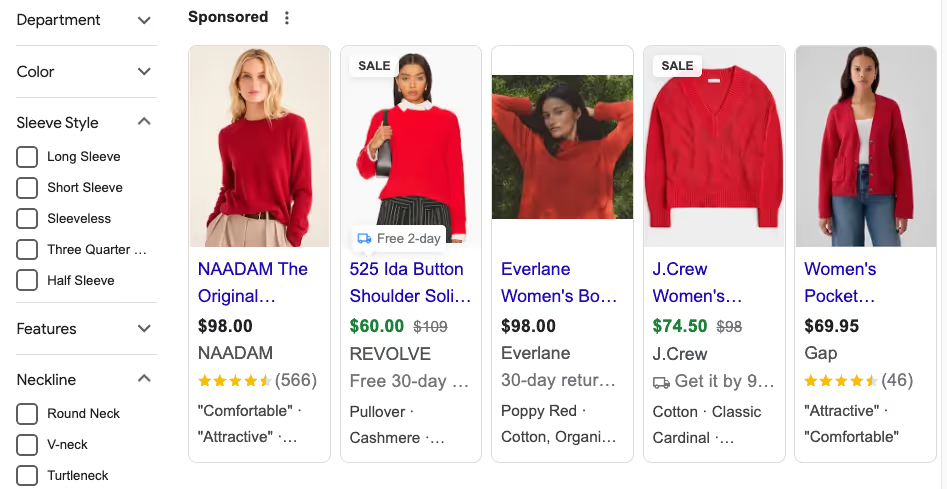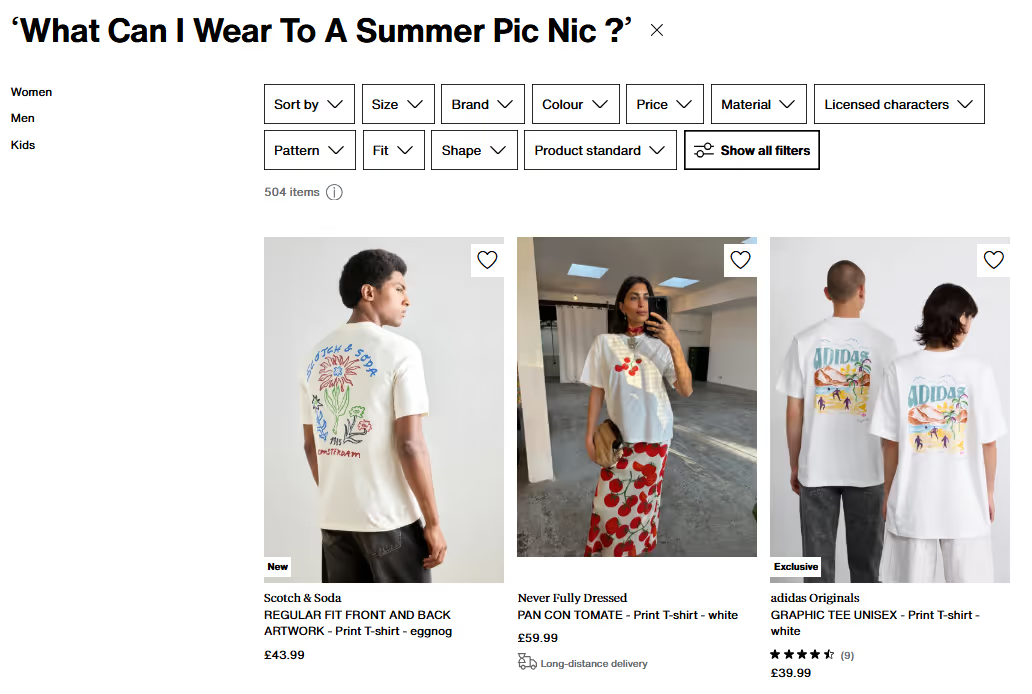
Product Search: Boost your Discoverability Online
Customer behaviours and business strategies have shifted significantly - nearly 87% of shoppers begin their product searches online (algolia.com), and consumers are increasingly leaning on AI assistants to guide their buying decisions. In fact, a recent Adobe survey found 39% of consumers have already used generative AI for online shopping.
The result? Traffic from AI-driven chat tools to retail sites has exploded (up over 1,200% in late 2024 according to Adobe Analytics (blog.adobe.com), redefining digital commerce.
In this article, we provide key insights to help retailers boost their online discoverability.
Google’s SGE and Optimized Product Pages
Google now displays a grid of product images (take red sweaters, for example) with interactive filters for features like sleeve style or brand, directly on the search results page (salesforce.com). This shift means shoppers can explore products and check prices right within Google’s results, rather than clicking through to retailer websites.

These image-heavy, AI-generated result layouts dominate screen space that used to be occupied by simple text links (salesforce.com). Shoppers are effectively browsing on the SERP itself, so your product pages become the next critical click after Google’s overview. Google has even started integrating ads into SGE’s AI results (as announced at Google’s 2025 Marketing Live), making the competition for attention on search pages even fiercer.
What to do?
Ensure your product pages are highly optimized and AI-friendly: accurate schema markup on all product pages and well-curated backlinks that align with important shopper intents. In practice, that means structuring your product data (pricing, availability, reviews, etc.) for Google and providing contextual links to and from your product pages that signal relevance for key search queries.
Optimise site performance and mobile experience: fast-loading, mobile-optimized pages improve user experience and SEO.
Conversational Search is Changing How We Shop
Shoppers now tend to use natural, conversational language in search bars. Instead of typing “protein bars kids” and filtering manually, a customer might ask, “What are some healthy snacks for kids?” and expect a smart, relevant range of options.
Voice assistants and chatbots have further propelled this trend. Google itself noted that almost 70% of requests to its Google Assistant are expressed in natural language rather than the stilted keywords of old.
Best Practices from Leading Retailers
- Zalando launched a ChatGPT-powered shopping assistant that lets customers ask things like “What can I wear to a summer pic nic?” and get personalized outfit recommendations.
- Second hand marketplace Mercari rolled out a similar AI assistant (“Merchat AI”) to help shoppers find gift ideas by asking conversational questions (modernretail.comodernretail.co).

Implement Semantic Search Technology
Semantic search uses AI/NLP to parse the meaning behind a query and match it to relevant results. By capturing the intent behind long-form queries, semantic search ensures shoppers find what they want without having to rephrase their question. By investing in smarter search, retailers can capture these high-intent customers: retailers with advanced, AI-driven site search see conversion rates up to 50% higher compared to those with only basic search functionality (opensend.com).
SearchGPT and Long-Form Content in E-Commerce SEO

Generative AI tools like ChatGPT, Bing AI, and Google SGE are changing how people discover products. Instead of searching “4K TV”, shoppers now ask detailed questions like “What’s the best 4K TV for gaming in a bright room?” These queries often happen early in the buying journey which is a critical window for brands to get discovered.
According to Salesforce, AI tools favour content-rich pages such as buying guides, comparisons, how-tos, and reviews when serving up results. Thin product pages and keyword-stuffed blogs no longer cut it.
Invest in high-quality, structured long-form content that answers real customer questions. For example: “How to choose the right size for summer dresses”
Sites like Currys and IKEA already lead here, creating SEO-rich content hubs that are frequently cited by AI assistants. With up to 60% of searches ending without a click, being the source of the answer is more important than ranking first. Strong content builds authority and earns your brand a spot in AI-generated responses or entices the few users who still click.
Ready to boost your discoverability and conversion?
At The Commerce Team Global, our experts have hands-on experience helping retailers adapt to these trends from technical SEO enhancements to implementing AI-driven strategies and technologies to improve discoverability, and operational efficiency.
Get in touch with us:
Contact: info@thecommerceteam.com
Follow us: LinkedIn

.jpg)

